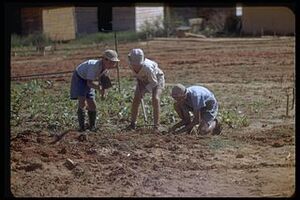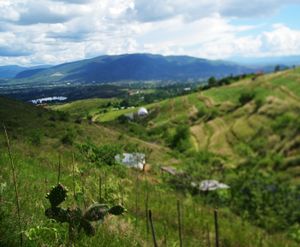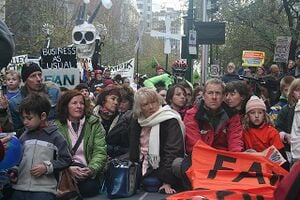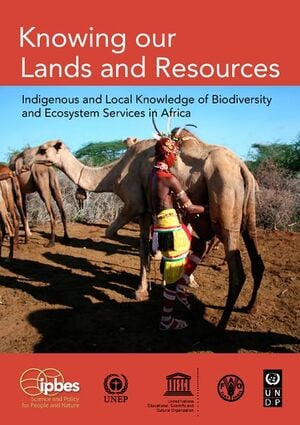
This page is the beginnings of a portal for Israel community action in response to Ecological emergency. Please see Ecological restoration for a topic overview.
Community action projects[edit | edit source]
Ecosystem restoration[edit | edit source]

 Recognition from UN for Nepal’s tiger range restoration opens doors for technical and financial support, news.mongabay.com (Feb 15, 2024)
Recognition from UN for Nepal’s tiger range restoration opens doors for technical and financial support, news.mongabay.com (Feb 15, 2024)  Low-carbon milk to AI irrigation: tech startups powering Latin America’s green revolution, theguardian.com (Jan 30, 2024)
Low-carbon milk to AI irrigation: tech startups powering Latin America’s green revolution, theguardian.com (Jan 30, 2024)  Opportunities from a community-led strategy to save Brazil’s dry forests from desertification, news.mongabay.com (Dec 11, 2023)
Opportunities from a community-led strategy to save Brazil’s dry forests from desertification, news.mongabay.com (Dec 11, 2023)
Ecosystem restoration is the process of halting and overturning degradation, resulting in cleaner air and water, extreme weather mitigation, better human health, and recovered biodiversity, including improved pollination of plants. Restoration encompasses a wide continuum of practices, from reforestation to re-wetting peatlands and coral rehabilitation.[1]
see also: Project Wadi Attir, Networks and sustainability initiatives
Citizen Science[edit | edit source]
Citizen Science refers to the involvement, participation and engagement of citizens in local or online (global) scientific work relevant to the citizens' interests, usually as a hobby, often as a passion.
Biodiversity activism[edit | edit source]
Society for the Protection of Nature in Israel (Hebrew: החברה להגנת הטבע, HaHevra LeHaganat HaTeva), or SPNI, is an Israeli non-profit environmental organization working to preserve plants, animals, and natural environments that represent bio-diversity, by protecting the lands and waters needed for their survival, and is Israel's oldest and largest conservation organization.
Best known to the public for sponsoring hikes (today, SPNI's hikes are guided in Hebrew - the only regular nature tours in English are through SPNI-Jerusalem branch), SPNI is also active in political and environmental improvement efforts. Projects have included working out an agricultural management plan for the Hula Valley to insure the health of migrating common cranes, and preventing the draining of a large area of salt pans, the last breeding site in Israel for Nubian nightjars. The campaign to create the 2004 Coastal Law, which forbids new development in any area within 300 meters from the coastline was a notable accomplishment. With almost 800 employees, SPNI is an enormous non-profit organization, with a wide range of activities, thus SPNI is known as well by its various divisions' names as it is by the name "SPNI".
Environment quality activism[edit | edit source]
Congestion, traffic and the resulting air pollution have created a public health crisis. SPNI is working to develop a sustainable urban transportation policy involving alternative means of public transportation and promoting new criteria for road construction. W
Open spaces activism[edit | edit source]
SPNI's Environmental Protection Division (EPD) is the watchdog and advocate for the little remaining open space left in Israel. Mass immigration has contributed to a drain on water resources, increased land usage for housing and industrial development, and major transportation congestion and pollution issues. Israel today is highly urbanized, with one of the world's highest population density rates. On a national level, the number of persons per square kilometer is very close to that of Japan, while the Tel Aviv area's density is higher than that of Hong Kong. SPNI is dedicated to finding creative solutions to preserve Israel's fragile ecosystem.
SPNI promotes conserving and establishing new Metropolitan Parks and recreation areas in central Israel. Lobbying for the legal establishment, infrastructure in public areas, for the purpose of using them as parks in population-dense areas that lack parks. The success of this project will ensure that there will be 8 open spaces in Israel's densely populated central region that will act as recreation, nature and sport areas close to place of living. W
Wetlands[edit | edit source]
Israel's rivers are in a state of crisis. Problems include drainage – draining water from the waterways for industrial, agricultural and residential use; sewage dumping – sewage and other waste, often toxic, is being dumped in the rivers; lack of enforcement – plans to protect the rivers and streams are postponed; and rapid development – unsustainable land development along stream banks cause serious harm to rivers, streams and water habitats. SPNI's River Rehabilitation Campaign strategically researches the problems, suggests solutions and networks with the various organizations to agree on a master plan, while running a public awareness campaign on river, stream and water management issues.
Israel's main source of fresh water is the Sea of Galilee. A major beauty spot for Israelis and visitors, the Kinneret has been threatened for years by overuse of its water and commercialization of its beaches. SPNI's Lake Kinneret Project enlists the cooperation of all involved parties in maintaining the Kinneret water levels and in keeping its shoreline accessible to the public for future generations. W
see also: EcoPeace Middle East, Peace and community safety
Coastal community activism[edit | edit source]
The Mediterranean coast is one of the country's greatest recreation and tourist assets. The creation of marinas, coastal housing, and private beaches limit the enjoyment of this asset by the general public. SPNI is working at every level to keep Israel's beaches clean, ecologically natural, and accessible to all. W
Urban and rural connections[edit | edit source]
section needed
Ecological emergency[edit | edit source]

There is consensus in the scientific community that the current environmental degradation and destruction of many of Earth's biota are taking place on a "catastrophically short timescale". Scientists estimate that the current species extinction rate, or the rate of the Holocene extinction, is 1,000 to 10,000 times higher than the normal, background rate. Habitat loss is the leading cause of both species extinctions and ecosystem service decline. Two methods have been identified to slow the rate of species extinction and ecosystem service decline, they are the conservation of currently viable habitat and the restoration of degraded habitat. The commercial applications of ecological restoration have increased exponentially in recent years. In 2019, the United Nations General Assembly declared 2021–2030 the UN Decade on Ecosystem Restoration. W
UN Decade on Ecosystem Restoration[edit | edit source]

 Green Deal: pioneering proposals to restore Europe's nature by 2050 and halve pesticide use by 2030, ec.europa.eu (Jun 22, 2022)
Green Deal: pioneering proposals to restore Europe's nature by 2050 and halve pesticide use by 2030, ec.europa.eu (Jun 22, 2022)
The UN Decade on Ecosystem Restoration 2021-2030 is a rallying call for the protection and revival of ecosystems all around the world, for the benefit of people and nature. It aims to halt the degradation of ecosystems and restore them to achieve global goals. The United Nations General Assembly has proclaimed the UN Decade and it is led by the United Nations Environment Programme and the Food and Agriculture Organization of the United Nations. The UN Decade is building a strong, broad-based global movement to ramp up restoration and put the world on track for a sustainable future. That will include building political momentum for restoration as well as thousands of initiatives on the ground.[2]
The decade was conceived as a means of highlighting the need for greatly increased global cooperation to restore degraded and destroyed ecosystems, contributing to efforts to combat climate change and safeguard biodiversity, food security, and water supply. W
See also[edit | edit source]
